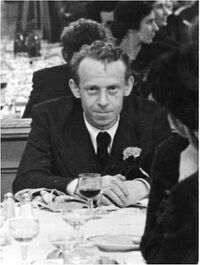More languages
More actions
Georges Politzer | |
|---|---|
 | |
| Born | 3 May 1903 Navyvarod, Hungary, Austro-Hungarian Empire |
| Died | 23 May 1942 (aged 39) France |
| Cause of death | Execution by firing squad |
| Nationality | Hungarian |
| Known for | Marxist Philosophy |
Georges Politzer (born Politzer György; 3 May 1903 – 23 May 1942) was a Hungarian Marxist who spent most of his life in France where he made large contributions to Marxist philosophy through his work at the Workers' University of Paris. He was murdered by the Nazis during the Second World War after he was captured and refused to write propaganda for them to disperse in Vichy France.
Life[edit | edit source]
Georges Politzer was born in Nagyvarad, Hungary a part of the Austro-Hungarian Empire (present day Oradea, Romania) on May 3, 1903. He left Hungary after the defeat of Bela Kun’s abortive Soviet Republic, settling in France in 1921. In the course of his travels he met Freud and Sandor Ferenczi in Vienna, and his interest in psychology resulted in the publication in him writing Critique of the Foundations of Psychology, the first outline of a materialist theory of social psychology.[1]
In France sometime between 1929-31 he joined the French Communist Party on his second attempt, where he was in charge of the Economic Commission of the Central Committee. He taught at both the Workers’ University and the PCF’s central school, and was among the founding group of the revue La Pensée.[1]
In September 1940, with France occupied by the Nazis, he entered the resistance and launched two clandestine journals, which he wrote for under the pen name Rameau, one of which he used to attack Alfred Rosenberg. He was arrested in February 1942 along with his wife Mai, a fellow communist and resistance fighter, for violation of the law banning the Communist Party. While imprisoned at the Santé prison in Paris he was in a cell next to communist resistance member Marie-Claude Vaillant-Couturier. Years later, she would speak of Politzer’s prison experience during her testimony at the Nuremberg War Crimes trial.[1]
Politzer was brutally interrogated, after which the Nazi interrogators asked if he wanted to write propaganda pamphlets for National-Socialism. When he refused they told him he would be put on the first train of hostages to be executed. On March 20, 1942 Politzer was turned over to Germany and he was executed with a group of hostages on May 23,1942. His wife was transported to Auschwitz, where she died in March 1943.[1]
Many of his courses and writings would later be posthumously published where they continue to be relevant to Marxist theory to present day.[1]
